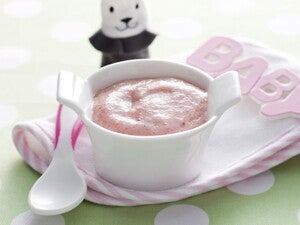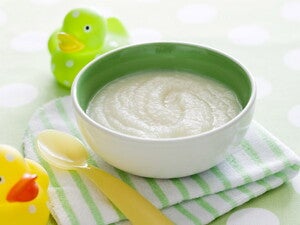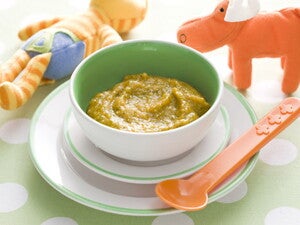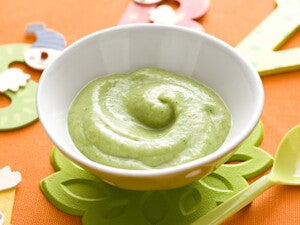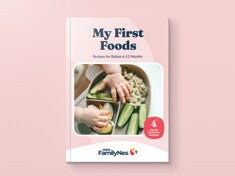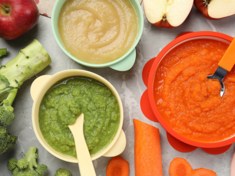
Infant Puree Recipes
Explore our collection of nutritious and easy-to-make infant puree recipes. From single-ingredient purees to gentle flavour combinations, these infant puree recipes are designed to introduce your baby to a world of healthy, homemade baby food. Created for little ones who are starting their solid food journey at around 6 months of age (not before 4 months), our baby puree recipes offer a range of exciting textures and nutrients for tiny tummies. Whether you're starting with first tastes or expanding their palate, you'll find simple, wholesome options to nourish your little one.
Discover these infant puree recipes and make mealtime a joyful experience as your baby discovers new flavours!
Get more infant puree ideas with our FREE baby recipes cookbook
Sign up or log in to Nestlé FamilyNes to access our free recipe books for pregnancy and beyond. Enjoy e-recipe books filled with nutritious and easy-to-make infant puree recipes and more. These nutritious meal ideas are created to support your baby’s early food journey with simple, wholesome meals designed for little tummies. Join today to start exploring!
What to keep in mind when introducing your baby to puree
Introducing your baby to purees is an exciting milestone, but it’s important to go at their own pace. Start with single-ingredient purees to watch for any reactions and gradually introduce new flavours and textures. Opt for smooth, well-blended purees at first, then slowly increase thickness as your baby gets more comfortable.
Remember to follow their cues—some babies take to solids quickly, while others need more time. Offer a variety to help them develop a taste for different foods. Most importantly, keep mealtime relaxed and enjoyable to build positive eating habits from the start!
Explore our infant food guides below for more guidance.
What do you need to start making homemade infant purees?
Making homemade infant purees is simple with just a few essential tools!
To get started, you'll need:
Fresh ingredients – Opt for nutrient-rich fruits and vegetables like sweet potato, banana, and avocado.
A blender or food processor – Can help create smooth, easy-to-eat purees. You can also just use a fork or food masher for this part.
Steamer or saucepan – To soften veggies and fruits before blending.
Storage containers – Small, airtight containers or ice cube trays to make portioning and freezing easy.
A soft spoon – These are gentle on your baby’s gums for a comfortable feeding experience.
With these basics, you can easily follow our step-by-step guide on how to prepare fresh, nutritious purees for your little one!
Infant puree recipes FAQs
How do I know when my baby is ready for pureed foods?
Most babies are ready for pureed foods at around 6 months. Signs of readiness include good head control, interest in food, and the ability to swallow purees without pushing them out with their tongue. Every baby develops at their own pace, so it's best to consult your healthcare professional if you have any concerns before introducing solids.
What are the best infant purees to start with baby?
Start with smooth, single-ingredient purees that are rich in iron, like pureed red meat, fish and spinach. Infant cereals are also a great choice as they are iron-fortified and already have a smooth texture. Then progress to other foods like pureed apple, steamed and blended sweet potato or pumpkin. These help babies get used to new textures and flavours without overwhelming their developing digestive systems.
What is stage 1 infant puree?
Stage 1 purees are the first solid foods introduced to babies, typically at around 6 months of age, not before 4 months. They are smooth, can be a bit runny, and made from single ingredients to help babies adjust to new tastes and monitor for any food sensitivities.
What is stage 2 Infant puree?
Stage 2 purees are introduced around 6 to 8 months when babies are ready for thicker textures and flavour combinations. These purees may include two or more ingredients, such as banana and strawberry or sweet potato and lentils and are slightly chunkier than Stage 1 purees to help babies develop chewing skills.
When should babies stop eating purees?
Depending on their readiness, most babies begin transitioning from purees to soft, mashed, or finger foods between 8 to 10 months. Signs they're ready include chewing motions, improved tongue control and an interest in self-feeding.

